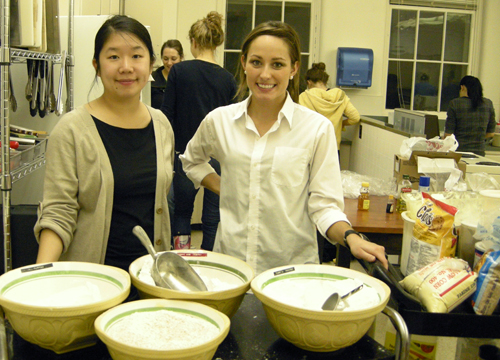
Money is tight for many students. For some, not being able to afford food is a serious concern, and for these students the Central Student Association (CSA) food bank can help provide the ingredients they need to put together meals. It’s far from an ideal solution, however. As applied human nutrition student Shaylin Aarssen says: “The regular items at the food bank have been deemed unexciting, flavourless and unappealing.”
Sure, canned beans and spaghetti sauce have nutritional value, but many students using the food bank have limited experience in cooking ─ as well as limited time ─ so they find it hard to use these food bank staples to make tasty meals they can afford.
Aarssen is part of a group of students who have joined forces to create a cookbook that will be, as he says, “student-friendly and full of tasty, low-cost recipes based on what is regularly available at the food bank.” The group includes several students in applied human nutrition; some ASCI*3000 “community project” students led by Prof. Anne Milne; student members of the Canadian Association of Food Professionals, plus their faculty advisor, Alison Crerar; and CAS food bank volunteers.
This project started over a year ago when Ivy Lam, a fourth-year nutrition student, learned from CSA food bank co-ordinator Krista Kermer that they were interested in putting together a student cookbook. After a slow start, Lam has collaborated this year with the new food bank co-ordinator, Molly McManus.
To facilitate the process, Lam took a course in food writing at George Brown College and worked with a group of students to put together a questionnaire for food bank users to determine what their needs are. “We asked about factors that affect how they cook, and the most significant ones turned out to be time and budget constraints,” says Lam. “So we’ve taken that into account in choosing recipes.” Other questions asked about unfamiliar foods and the types of dishes they’d like to learn to prepare.
Lam contacted faculty and students to involve them in the project, and more than 40 people signed up to lend a hand in creating and testing recipes. Aarssen says: “It’s been such a good mix of students from different programs with different areas of expertise. We’re trying to address nutrition and cultural needs, as well as promote sustainability.”
The cookbook team looked through a variety of published cookbooks and other resources for potential recipes. The survey had found that food bank users also wanted dessert ideas ─ hey, everyone needs a treat sometimes ─ so those were included too. The desserts are made with nutrition-boosting ingredients such as whole grains, fruits and beans.
Before any recipe could be included in the book, it had to be tested ─ and not by professional chefs. “Prof. Crerar arranged for us to use the kitchen in Macdonald Institute on Monday nights. We spend an hour preparing the food, then we all sit down and taste the food,” says Aarssen. “By having students make the recipes, we soon find out if they are too complicated or if the recipes aren’t written clearly. We critique each one and try to find creative ways to make them tasty, nutritious and easy.”
Two of the hits so far are Mediterranean Tuna Pasta and Chocolate Chip Cookies made with pureed beans. These use food bank staples ─ canned tuna, spaghetti sauce and canned beans ─ and provide good nutrition, but the ingredients are used in new ways and with new flavours.
Lam says another goal is to raise awareness of the food bank and the need to support its services. She hopes to have the book completed and copies printed by the end of March. To achieve that goal, Lam and her team are looking for additional help. “We need to organize funding and marketing support for the cookbook,” she says, “and we hope to find someone to design an eye-catching cover.”
Aarssen says the enthusiasm among the participants has been inspiring: “There’s so much positive energy among the students working on this.” The end result, she hopes, will be a practical solution for those who find food, money and time all in short supply.